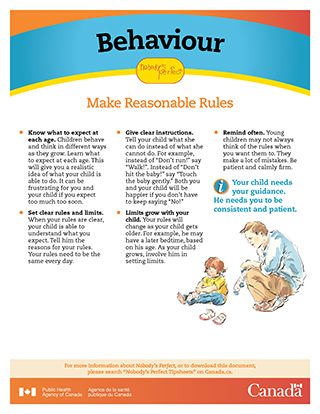Behaviour: Make Reasonable Rules
- Know what to expect at each age. Children behave and think in different ways as they grow. Learn what to expect at each age. This will give you a realistic idea of what your child is able to do. It can be frustrating for you and your child if you expect too much too soon.
- Set clear rules and limits. When your rules are clear, your child is able to understand what you expect. Tell him the reasons for your rules. Your rules need to be the same every day.
- Give clear instructions. Tell your child what she can do instead of what she cannot do. For example, instead of "Don't run!" say "Walk!". Instead of "Don't hit the baby!" say "Touch the baby gently." Both you and your child will be happier if you don't have to keep saying "No!"
- Limits grow with your child. Your rules will change as your child gets older. For example, he may have a later bedtime, based on his age. As your child grows, involve him in setting limits.
- Remind often. Young children may not always think of the rules when you want them to. They make a lot of mistakes. Be patient and calmly firm.
Key Message
Your child needs your guidance. He needs you to be consistent and patient.
Fun & Easy Activities
Simon says...
- This game helps children practice listening carefully and following instructions. It works best with children who are aged 4 years and older. Some 3 year olds may also enjoy it. You can play with just two people or with a whole group.
- The person who is "Simon" stands facing the others. When Simon says, "Simon says touch your cheek," the others touch their cheek. Simon continues giving orders to do different movements. As long as he begins with "Simon says," the others obey him. But when Simon just says, "Touch your toes," for example, no one moves.
- With young children, it is better to play without winners and losers. If someone follows an order when they were not supposed to, just laugh and go on. Take turns being the leader.
A Soundtrack for Your Routines
- Songs are an easy way to remind children of the behaviour that you expect. Children would rather do what the song tells them to do than take orders from you. You can make up new words to a familiar tune. For example, try calling them to lunch with "If you're hungry and you know it, come and eat." Sing it to the tune of "If you're happy and you know it."
- Some children find it very stressful to move from one activity to another. A made-up song like this can help. It changes the mood and gives the signal for what will happen next. Your child will quickly learn to recognize the song. The first two notes are enough for him to understand what you expect. He may even start singing with you. Then he has the whole rest of the song to decide to do what you want him to.

Download the alternative format
(PDF format, 1.2 MB, 2 page)
Organization: Public Health Agency of Canada
Program providers: Please use this space to input your organization's information.